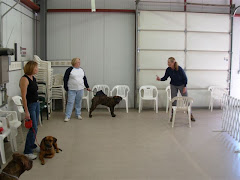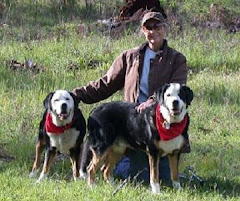
It looks like a torture device, but it is quite the opposite. The good old prong collar, sometimes called a "pinch collar," can save relationships, preserve your health, fine-tune an already wonderful obedience dog, and save a LOT of wear and tear on a hard-headed dog's neck.
These training collars are comprised of a series of steel links that connect to a short chain assembly. The links are shaped like prongs, and they are blunt on the ends. You hook the leash to a ring on the chain assembly. When you give the leash a tug to correct the dog, all the prongs uniformly depress onto the dog's neck, and then release again. Instead of a "choke chain" action, the dog gets a pinching sensation which can be mild or severe, depending on the circumstances, the dog, and the type of prong collar you're using.
The prong collar can work miracles for dogs who are otherwise "dull" or unresponsive to a conventional "choke chain." Dogs get sort of oblivious to choke chains after a while if they are not used correctly or responsibly (and most are not). But the prong collar, when used judiciously, can quickly wake up the most stubborn or nonchalant of dogs. Let's be frank: it inflicts discomfort. The dog learns to avoid the discomfort by trying a little harder to do what you want him to do.
The discomfort is minimal and, in some cases, less than they may experience with a choke chain. Lay one of these prong collars on the tenderest part of your wrist. Now snap the chain to tighten it and release. Not much discomfort there, is there? Now try the same thing with a choke chain on your wrist. You'll be surprised to find that "less accomplishes more" with the prong collar. It's like comparing a gentle slap to a shove. The prong collar's "slap" is much more startling than the "shove" of a choke chain. Nobody likes to be startled, and that's the whole point. We seek ways to avoid being startled. In the dog's case, he tries harder to pay attention and comply with your wishes, in order to avoid being startled.
Prongs for these collars come in three basic sizes, because some misguided person thought that big dogs needed big prongs. WRONG!!!! Just about any dog (except, perhaps, a super-hairy malamute or Great Pyrenese) can use the SMALL prongs. They are much more effective than the large, heavy prongs. Small prongs are sharper and more delicate. Again, you can accomplish more correction with less work. And the poor dog doesn't have to wear 10 pounds of steel links that make him look like a killer.
But here's the problem: The collars are sold typically with only 10 links. If you have a Rottweiler with a 20-inch neck, you're going to have to buy ADDITIONAL LINKS. Many pet stores either don't stock these extra links or don't have a clue how to add them to your collar. If you go to Petsmart or Petco, the hired help will try to talk you into collar with the LARGE links because they think big dogs need stronger links. Again, this is absolutely wrong. Unless you know exactly what you need, don't buy such devices at the big pet stores because the sales help generally doesn't have the knowledge to properly assist you.
The best place to go for a properly sized prong collar is a reputable trainer who either stocks these items or can get them for you. There's a trick to getting the right number of prongs for your dog, so get some help. Also get a quick lesson on how to use it. The reputable trainer might even talk you out of the prong collar and suggest something else, like a Gentle Leader head halter or just a different training approach. While the prong collar can be a godsend for certain dogs and certain situations, it is not the end-all and is not a substitute for good basic leadership training. It is only a tool.
Don't let the do-gooders talk you out of using prong collars if a trainer has suggested one for your dog. They've been around for years and are still relied upon and respected by top obedience handlers who love their dogs every bit as much as you love yours. Remember that, in many training situations (i.e., with dogs who pull hard on the leash), the prong collar may actually be easier on your dog's neck than a choke chain, and definitely easier on his neck than a plain flat collar.
Prices: 10-link prong collars range from around $12 to $20. Additional links are about $1.25 to $1.50 apiece.


















No comments:
Post a Comment